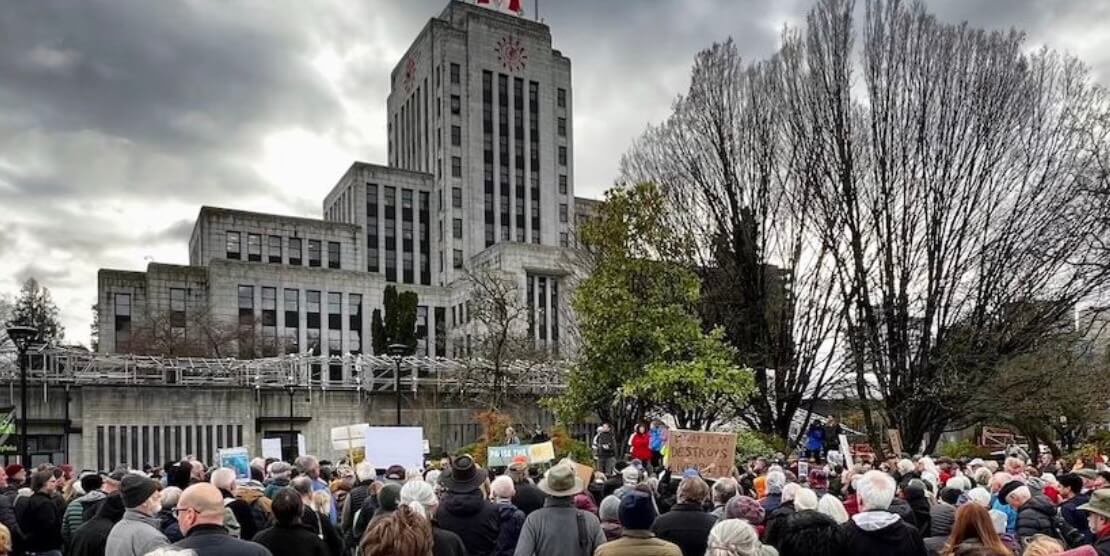
Dec 15, 2024: City Council Approves Amendments to the Broadway Plan
In a unanimous vote Thursday Vancouver City Council voted to expedite the Broadway Plan and allow even more density in the 500-block area covered by the Plan.
The night prior, desperate tenants living within the Broadway Plan area pleaded with Councillors to slow down the Plan, which could see hundreds, if not thousands, of demovictions in neighbourhoods that follow the Broadway Subway line. Those neighbourhoods currently contain some of Vancouver’s most affordable housing.
In an open letter to the City, 22 housing experts asked that at the very least, the affordable built stock be protected, and criticized the City for allowing “a frenzy of profit speculation, land banking, flipping and land inflation into the heart of vulnerable established, mixed-use neighbourhoods.” The letter, however, failed to change the minds of the ABC-dominated Council.
Chris Mah of the City’s Special Project Office called the amendments necessary to align with provincial transit-oriented requirements (in fact for some areas, the City plans exceed the provincial guidelines). The amended Plan will allow for more hotel rooms in hi-rise towers of between 12 and 40 storeys, and remove the minimum number of towers per block in some areas. Mah said the changes will occur “incrementally over decades.”
The Broadway Plan was supposed to have a 30-year build out, but 139 development applications that represent 20,324 homes are already in the pipeline, according to the Planning department. The newly-approved amendment calls for 41,500 homes, an increase that will largely be accomplished through dozens of new high-rises peppered throughout low- and mid-rise neighbourhoods, says Vancouver writer Kerry Gold. Writing in Friday’s edition of the online real estate publication Storeys, Gold said that “City staff insist that the older houses and retail buildings that have shaped much of the city’s character will not be completely wiped out in favour of a concrete jungle, but critics say that over time, that’s exactly what will happen and as development encroaches on Mount Pleasant and Kitsilano’s shopping districts, gentrification will push out mom-and-pop shops as well as renters who’ve enjoyed affordable rents in older buildings.”
While politicians and planners grapple with ideas on how to soften the blow to renters, more and more blue demolition signs are popping up across the Broadway Plan area. Tenants are quickly losing faith in City promises.
Registered speakers who waited patiently to speak to Council were allowed only three minutes to comment on a 365-page document that staff released just days before the Dec.11 meeting. And the chair, Cllr. Lenny Zhou, sitting in for Mayor Ken Sim, made sure people stuck to the time limit — impolitely cutting them off mid-sentence when their time was up.
The great majority of people spoke in opposition to the amendments and to the Broadway Plan in general. Many complained they were not given enough time to read the lengthy information dropped into the Plan and other items added to the report at the last minute.
Calling the Broadway Plan a “land grab,” opponents said that “turbocharging” the Broadway Plan (which will add about 38% more housing) right before Christmas left a bitter taste in their mouths. Housing activist Theodore Abbott said the amendments will “tear apart the fabric of the city” and asked that Council involve the public in forming a better plan that “works for everyone.”
The meeting went on until the wee hours, becoming tense at times. One speaker criticized City planners for encouraging hi-rise towers in an earthquake zone. “Mayor and Council you should be ashamed of yourselves. You should resign, he told them. Another speaker told those listening to ignore the people who had spoken against the Broadway Plan, and to treat them the same as one would treat “climate deniers.”
Still another speaker said Vancouver will end up a “butchered city. I feel completely disrespected. This makes it clear you don’t want to hear from us,” the speaker told Council, accusing Councillors of breaking the “elector’s trust.” Council heard not just from renters but from homeowners who could soon find themselves living in the shadows of hi-rise towers.
Council accepted some amendments to the Plan, and added a few minor ones. Cllr. Kirby-suggested the City consider opportunities in key locations (such as major intersections or larger) that could generate cash amenity charges to support public realm investments. That passed unanimously.
Cllr. Carr’s amendment that Council direct staff to report back on the TRPP (Tenant Relocation and Protection Policy), to reassess tenant compensation in the event that no development permit application had been submitted after a specified period of time following rezoning. The amendment passed, with only Cllr. Montague in opposition.
The majority of Councillors voted against a request to report on the effects of speculation along the high streets and small businesses in the area. Cllr. Peter Fry asked Acting Director of Planning Matt Shillito if speculation is already taking place on properties within the Plan. Shillito said “No,” he was not aware of any.
Here are some reasons Councillors gave for approving the Broadway Plan amendments and implementation:
Cllr. Peter Meiszner: To create more deeply needed housing. The fact that some of the proposed developments will never get built means the Broadway Plan will actually advance more slowly than people expect, he said. Years from now, Meiszner said, we will look back and realize we did the right thing. “I have sympathy [for renters]. We will do everything we can to take care of those tenants.”
Cllr. Sarah Kirby-Yung: “We have to align with the Provincially mandated TOAS (transit oriented areas).” She said the Broadway Plan will take years to build out, and right now, there is less than a 1% vacancy rate for housing rentals. “We’ve heard from a lot of people,’ she said, telling the public not to worry because most of the existing older buildings in the area “will need to be replaced anyway.”
Cllr. Fry: “I have a great deal of faith in our policies,” he said. At the same time Fry worried about the new Villages Plan proposed for neighbourhoods city-wide. “It’s a tough time for our City.…The villages are smack-dab in the middle of TOAS. And that, Fry said, “could be disastrous.”
Cllr. Adriane Carr: The Broadway Plan ensures there will be many parks and it deemphasizes cars, protects trees and includes First Nation art. Carr said she still believes there are too many towers in the Plan, noting that if Council had voted for a slower pace of change earlier this year, “It would have made a difference.”
Cllr. Klassen: Vancouver, he said, is good at building cities, pointing to the West End as a unique model of excellent urban planning. Klassen likes the idea of providing more below-market housing units within the Broadway Plan, and says he is confident the Province will respond by building more schools and daycare centres. He also likes the idea of locating high towers off arterials. “The Broadway Plan,” he said, will enhance communities.”
Mayor Ken Sim: The mayor shared his own personal story about his family’s struggles with poverty, but said that Council has a responsibility. “It doesn’t mean we don’t recognize how scary this is. We empathize with the speakers. I know this is not going to be easy for some individuals.” Sim added that Vancouver has some of the best tenant protection on the continent.
He said the Plan will be good for the City, then apologized to all those who will be facing eviction. “I’m sorry about that,” he said, “we have to go through this transition.”
Photo above: City Hall Watch



No Comments